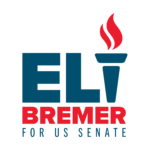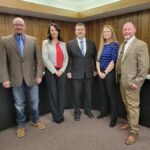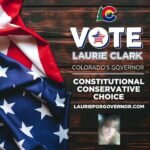Imagine This Scenario:
A government imposes lockdowns for a virus, closing many small businesses. The ones that remained afloat are on the brink of failure. The government creates a program that aggressively encourages small businesses to take out loans, with the hopes of the loans being forgiven. So they aren’t directly responsible for vetting loan applicants, the government funnels the money through banks/lenders, who offer assurances to the borrower through the forgiveness program. If fortunate enough to be approved, the small businesses received loans, averaging less than $50k, while publicly traded companies received millions.
The small businesses then find out from the bank that they were approved for too much by the bank, and they are no longer eligible for the forgiveness program previously advertised by the government and banks. Although still reeling from imposed lockdowns, the small business must begin repaying the loan immediately, with interest. The government focuses then on “reviewing” the small business loans under $2M, and chooses not to review loans over $2M.
Unfortunately, this scenario is unfolding in the US, in another attempt to kill any small business fortunate enough to survive imposed lockdowns aimed at the greatest transfer of wealth from poor and middle classes to the wealthy. The middle class is being systematically erased, a process often observed at the onset of socialism or communism.
The Beginning of the End for Small Businesses:
When Congress passed the Paycheck Protection Program (PPP) and Economic Injury Disaster Loans (EIDL) in early 2020, numerous small businesses applied for the program to ensure they could continue operations, despite the draconian government COVID-19 lockdowns that were crippling businesses and wreaking havoc on the economy.
In addition to staying afloat during economic uncertainty, the PPP, operated by the Small Business Administration (SBA), included an enticing draw for small businesses to apply: if the majority of the loan was spent on payroll, with a small portion applied towards qualified expenses (rent, equipment, etc.), the loan would be entirely forgiven, or converted to a 1% loan.
The SBA streamlined their loan application processing to distribute funds more quickly, to the businesses that needed the assistance the most.
The program was met with high demand. As of May 31, 2021, the SBA has distributed over $799,832,866,520 through 11,823,594 loans. As a general comparison, the SBA distributes $16.7B through 62,000 loans, on a yearly average. This surge in demand and urgency of funds needed created the perfect storm for problems to arise. It was apparent and that the demand, coupled with oversights and laxed controls around loan qualification/distribution and ever changing stipulations, created loopholes rife with opportunity for fraud.
The US Government Accountability Office (GAO) stated in October 2020, “Given the immediate need for these loans, SBA worked to streamline the program so that lenders could begin distributing these funds as soon as possible. For example, lenders were permitted to rely on borrowers’ self-certifications for eligibility and use of loan proceeds. As a result, there may be significant risk that some fraudulent or inflated applications were approved.” The rush to qualify applicants and disburse funds took priority over vetting small business loans.
Loans Distributed:
Over 86% of the PPP loans issued, by a published in 2021, were under the amount of $50,000. before funds were exhausted, they are now dealing with more hurdles – reviews of loans that make parts of the loan ineligible for forgiveness and/or unsatisfactory documentation to qualify for loan forgiveness. When a small business owner applied for a PPP loan through a lender (bank), – the business owner is at fault and must begin repaying any overage immediately, as it doesn’t qualify for forgiveness. This means the amount disbursed (designated by the bank/lender) was over the allotment in which they were entitled to isn’t eligible for the advertised forgiveness. Any overpayment will not qualify for forgiveness, and the business must begin repaying the amount immediately, with interest.
The reveals, for various reasons, that only 53% of loans have been approved for loan forgiveness.
To be clear, if an application was received on fraudulent provided by the borrower, the borrower should be prosecuted, and when possible. However, a bank’s approval of a loan based on accurate data should not penalize the borrower. Small businesses agreed to the terms of the loan that the bank/lender approved, and the terms are changing, as more arbitrary “reviews” are being conducted. Unfortunately, the lenders bear no responsibility in the upheaval of a small business over it’s “good faith error.”
Read about several of the devastating PPP loan fallouts .
Targeting the Small Fish:
To add injury to insult, the SBA has announced it will drop the review of any over $2 million. Instead, they are truly focusing on the small businesses who needed help to move past the economic disaster imposed by government lockdowns and turning a blind eye to businesses who “qualified” for loans over $2 million.
In just the first year of the COVID-19 scandal, over closed. That number does not include businesses that closed in 2021 or businesses who have not yet reported their closures. Individual companies such as restaurants, nail salons, and retail shops make up for 130,000 of those closures.
Don’t worry; the FED, via , says that’s not “as bad as it could be.”

What exactly does that statement mean? Be thankful, America. If you owned a small business, you made the ultimate sacrifice for others’ safety. If you closed your business entirely last year, the FED isn’t worried. You simply lost your livelihood to make your neighbors feel safe amidst the greatest scandal ever perpetrated on humans in history. If you tried to survive and took out a small PPP loan that hasn’t yet been forgiven, you could just be part of a system trying very hard to shut you down.
After all, Bezos, Gates, and Fauci need your $50k per year more than your family needs food and shelter, right? Welcome to communism. Things may become even more difficult in 2021.







